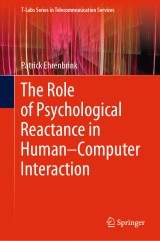Details

The Role of Psychological Reactance in Human-Computer Interaction
T-Labs Series in Telecommunication Services
|
CHF 59.00 |
|
| Verlag: | Springer |
| Format: | |
| Veröffentl.: | 25.10.2019 |
| ISBN/EAN: | 9783030303105 |
| Sprache: | englisch |
Dieses eBook enthält ein Wasserzeichen.
Beschreibungen
<p>This book provides an in-depth investigation on the psychological phenomenon "reactance“ in the context of Human-Computer Interaction (HCI). The author argues that the complexity and autonomy of modern technology can sometimes be overwhelming and can then be perceived as a threat to freedom by its users, thereby diminishing acceptance. The book investigates if and how this is the case and provides strategies to regain the lost acceptance. Topics include relevance of reactance on HCI, triggers for reactance, consequences of reactance, measurement of reactance, and countermeasures to reactance.</p><p></p>
Introduction.- Part I.- Motivation.- Part II Relevance of Psychological Reactance in Human-Computer Interaction.- Psychological Reactance Relevant for Human-Computer Interaction.- Literature Search – Reactance in Literature.- Expert Survey-Triggers for State Reactance.- Smart Home Study-Trait Reactance.- Intermediate Discussion on the Relevance of Psychological Reactance for Human-Computer Interaction.- Part III Measurement of State Reactance.- Research Question: How can State Reactance be Measured.- Reactance Scale for Human-Computer Interaction.- Validation.- Intermediate Discussion on the Reactance Scale for Human-Computer Interaction.- Part IV Determinants of State Reactance.- Research Question: What Factors Influence State Reactance.- Persuasive Assistant Study-Moderator Variables.- Intermediate Discussion on Determinants of State Reactance.- Part V General Discussion.- Research Outcomes.- Outlook and Future Research.- Conclusion.<p></p>
<p>Patrick Ehrenbrink studied Cognitive Science at University of Osnabrück and Human Factors at Technische Universität Berlin. He completed his PhD at the Quality and Usability Lab at Technische Universität Berlin. He was also appointed as a Research Fellow at the University of Technology, Sydney. He has published in several major journals and conference proceedings.<br></p>
This book provides an in-depth investigation on the psychological phenomenon "reactance“ in the context of Human-Computer Interaction (HCI). The author argues that the complexity and autonomy of modern technology can sometimes be overwhelming and can then be perceived as a threat to freedom by its users, thereby diminishing acceptance. The book investigates if and how this is the case and provides strategies to regain the lost acceptance. Topics include relevance of reactance on HCI, triggers for reactance, consequences of reactance, measurement of reactance, and countermeasures to reactance. <div><p></p><ul><li>Provides an analysis of the phenomenon of psychological reactance to technology in the context of HCI;</li><li>Presents strategies to increase user acceptance of complicated or intimidating technology;</li><li>Includes measurement tools for psychological reactance.</li></ul><p></p><p></p></div>
Provides an analysis of the phenomenon of psychological reactance to technology in the context of HCI Presents strategies to increase user acceptance of complicated or intimidating technology Includes measurement tools for psychological reactance
Diese Produkte könnten Sie auch interessieren:

High-Frequency Oscillator Design for Integrated Transceivers

von: J. van der Tang, Dieter Kasperkovitz, Arthur H.M. van Roermund

CHF 177.00















